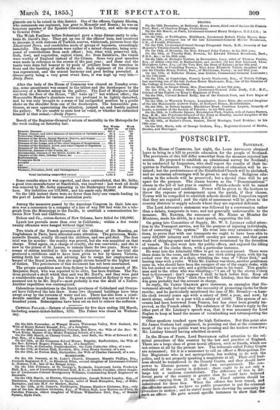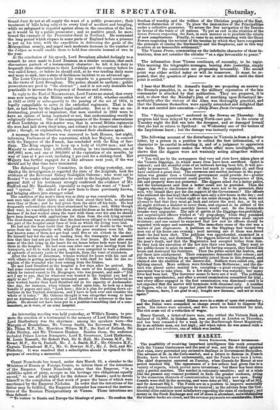POSTSCRIPT.
The Lord Advocate's statement was followed by a conversation rather than a debate, temperate in tone, and not generally unfavourable to the measure. Mr. Emma, the successor of Mr. Hume as Member for Montrose, made his debfit, in a neat speech, supporting the bill.
On going into Committee of Supply, Mr. W. S. LINDSAY called atten- tion to the Transport service, not for the purpose of injuring individuals, but of correcting "the system." He went into very extensive calcula- tions, to prove that with our transports we ought to have been able to carry 550,000 infantry and 110,000 cavalry per annum ; and that great waste of shipping-space and means had been occasioned by the detention of vessels. He also went into the public offices, and exposed the idling condition of the clerks there, with a particular instance.
He went into the Admiralty Office to get an account passed. There were three desks in the room, and there was one clerk sitting alone, with his leg cocked over the arm of a chair, whistling the tune of "Peter Dick," and beating time with a ruler. While Mr. Lindsay was there, another gentleman came in, who should have been the occupier of one of the empty desks, with his hat cocked on one side, and a goldheaded cane in his hand. This gentle- man said to the other who was whistling—" I am off by the eleven o'clock boat to Gravesend : don't suppose I shall be back before four. Keep all quiet." The " Peter Dick" clerk then told Mr. Lindsay, that the other who was gone probably had the account in charge. In reply, Sir JAMES GRAHAM gave instances, as examples that Go- vernment already feel and obey the necessity of promoting clerks for their merits; and he particularly mentioned the case of Mr. Bromley—a hum- ble clerk twenty years ago with a salary of 2001. a year, and now, by merit alone, raised to a post with a salary of 14001. The system of ac- counts had been borrowed from France, but has since been greatly im- proved, as the French admit. The substance of Sir James's reply to the other part of Mr. Lindsay's speech was, that it was necessary for Lord Raglan to keep at hand the means of reembarking and retransporting the troops.
Other speakers touched upon the high Estimates. But this point also Sir James Graham had explained, in pointing out that at the commence- ment of the war the public want was pressing and the tenders were few; Mr. Lindsay himself having admitted as much.
In the House of Peers, Lord BROUGHAM called attention to the cri- minal procedure of this country by the law and practice of England. There are a large class of gross moral offences, such as frauds, which are not crimes at all by the present law. The tribunals called Police Courts are misnamed ; for it is a misnomer to call an officer a Metropolitan Po- lice Magistrate who is not metropolitan, has nothing to do with the police, and is not properly speaking a magistrate at all. Their civil busi- ness should be transferred to the County Courts, and they should hcon- stabulary of the country is deficient : there oughtizatnocoebsfefeneost ionnlcuy fa_ power to liberate persons on their own recogn
large but a uniform constabulary. The dill' o
dif- ferent parts of the country is greater 3t8han he couldhave believed Fixed salaries should be possible—varying from 21. 48. to 61. 138. substituted for these fees. When the offence has been traced, and the.offender secured, we have no public prosecutor to put the criminal procedure in motion ; and be stated many facts showing the necessity for uch an officer. He gave several specific instances to show that the Grand Jury do not at ell supply-the want of a priblic prosecutor; their treatment of bills being subject-to -every kind of accident and bungling, -while no safeguard is -required against abuse in the execution of thelaw, pa it would be by a public prosecutor - mad As positive proof, he men- tioned the example of the Procurator-fiscal in Scotland. He eontrasted -the long-period which elapses in some-parts of England before a prisoner is put on his trial, with the expedition in delivering the gaols of the Metropolitan county, and-urged such moderate increase in theriumber of the Judges as would enable them to hold four circuits inateachof two in the year. At the conclusion of his speech, Lord Brougham Alluded.feeliegly toe -remark he mice made to Lord Denman 071:a similar occasion, that such discussions partook of a testamentary character : he felt it his duty to bequeath these observations to their lordships and the country-before he was called hence, or before he should sink, as he was tending ,dailymores and more to sink, into &state of feebleness incident to-an advanced age.
The Loan ClIANCY.LLOB limited his remarks to a general concurrence bathe views of Lord Brougham. Thesalice , should be uniform ; public prosecutors are good in "the abstract" ; and it is not only desirable but practicable to increase the frequency of Sessions-and Assizes.
In reply to the Earl of MAtaresauire, Lord Pereaune stated, that every man now serving in the Militia under the act of 1854, whether enrolled in 1852 or 1853 or subsequently to the passing of the act of 1854, is legally compellable to serve in the embodied regiments. That is the law, as laid-down by-the highestlegal authority. But as it was an .un- derstanding, prudent or imprudent, that men enrolled in 1852 -were to .have an option of being reattestecl or not, that understanding mould be religiously observed. One of the consequences of the former observations of their Lordships on this-matter was, •that in several Militia regiments the men-had laid down their arms, and refused to be subservient to disci- pline ; though, on explanations, they resumed their obedience again.
A message from the Crown was conveyed to both Houses, last night, informing Parliament of the convention, which -her Majesty, in concert with the Emperor of .the French, has concluded with the King of Sar- dinia. TheiKing engages to keep up a body of 15,000 men; and her Majesty to advance him 1,000,Q001. sterling in two instalments, one of 600,000/. now, and one of 504,0001. at the expiration of six months, by way of loan at 4 per cent, including 1 per cent for a sinking-fund. Rer Majesty has further engaged for a like advance next year, if the war should- not by that time have terminated.
The Sabastepol Inquiry Committee, in their sitting yesterday, COP.* Ciallieg the investigation as regarded the state of the hospitals, look the evidence of .the Reverend Sidney Godolphin Osborne ; who went oat to Scutari "to render what assistance he could in the hospitals there." The etlelal drift of his testimony strongly confirmed the evidence of Mr. Slafford_and.Mr. Macdonald, especially as regards the want ,of " bead " and " system." He added a few new facts to those previously known, and bringingothers into stronger relief. The condition. of the men's linen was as dirty as was conceivable. He had seen men take off their shirts and hide then about their beds, so ashamed were they of -them ; and he had given them the shirt off-his back. He had frequently eolleotedthe shirts thus abandoned-by-them ; and, -filthy though - they were, be was obliged to hide them abonthis dress as he took-them away, because if he had -walked along-the ward with them over his arm he should have been.besieged with applications for them from the sick lying around. The dead-house was so situated that the dead were obliged to be earned along one part of the hospital amid lines of beds on which the living were laid. He bad not the least doubt-that thegreat amount of deaths in-the -wards
• arose from the -irregularity with which the poor creatures were fed. 'He - had known _someof them not get food until five or six o'clock -in -the day. He himself had fed the sick on landing from the transports; who assured .him that they had not got food for three or _four hours. He had also seen =me of theesick lying on the beach for six hours before _beds were found for them in the hospital. He bad seen case:after case of men landing from the transports, not ft.to walk ten yards, who were compelled to walk a distance of al wards of seventy yards to the hospitals, from the want of stretchers. After the battle of Inkerman, witness worked for Itours with his coat Jeff with others in getting sacking and Pine it with chaff for heels for the re- ception of the wounded who were coming from the Crimes.
lIe met Lord Stratford at the hospital a few days After he arrived. He had some conversation with _him as to the _state of the hospital ; during which he turned round to Dr. Macgregor, who was.present, .ancLsaid—" Did not I arty to you, that for whatever was wanted in the hospital you bad So Apply to me ?" Dr. Macgregor intimated assent. Mr. Osborne believed.no man worked harder than Lord Stratford did in his capacity of Ambassador. One day, for instance, when witness called ..upon him, he -took up a large bundle of papers and said, "Look here-; this is a ,plan for putting down ex- tortions in the Turkish ileminions, anclI have to look over and consider the Whole of it -today." "Mr. Osborne thought it was altogether wrong to have putran Ambassador in the position of Lord Stratford in referent* to the hos- -petals. Hearhould not have -beenput in-a position resembling that of a cora- sasandant, As it were, of an army hospital.



























 Previous page
Previous page